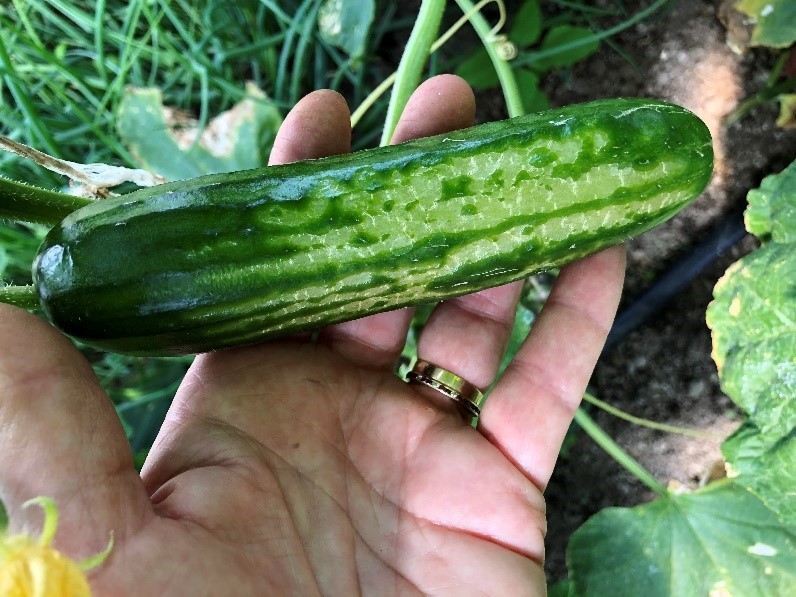Thrips damage to High Tunnel Cucumbers
Amy Ivy, Vegetable Specialist
Eastern New York Commercial Horticulture

Cucumbers thrive in high tunnels but so do the pests that love them so. This week I saw extreme feeding injury caused by thrips, not just to the leaves which is typical, but to the fruit as well. Unfortunately we don't have many control options, and with so many generations a season this is a particularly difficult pest to control.
An organic option is spinosad (Entrust) and a conventional option is Baythroid, both approved for tunnel application. Bio-control options exist but must be introduced early and repeatedly to keep the thrips population in check. They are not effective once the pest population is well established. Both western flower thrips and onion thrips can infest and significantly damage cucumbers.
For more information on thrips, mites and other high tunnel pests see the Sustainable Pest Management in Greenhouses and High Tunnels, a SARE factsheet based on Judson Reid's research below.
This article was printed in the May 24th, 2018 issue of ENYCHP Veg News. To view the full newsletter, click here.
Sustainable Pest Management in Greenhouses and High Tunnels (pdf; 1444KB)

Upcoming Events
African Eggplant Participatory Breeding Kick-Off
March 5, 2026
Join us to learn about the Cornell African Eggplant Research Project and learn how you can participate! African eggplant, also known as Bitterball, Garden Egg, Kittley and other names, is an important crop for many members of our community with heritage from regions such as sub-Saharan Africa, Southeast Asia, and Brazil. Since 2024, the Cornell African Eggplant Research Project has been collaborating with growers and community partners across New York to develop high-quality varieties adapted to the Northeast U.S. In this meeting, we will share information about growing and preparing African eggplant, highlight our research to date, and invite partners to collaborate with us in our 2026 participatory breeding and variety selection efforts.
COST: FREE! You must pre-register to receive the Zoom link.
Managing the Invasive Swede Midge Webinar
March 6, 2026
Swede midge is an invasive fly that causes serious economic losses to brassica crops. Due to its small size and hidden feeding habits, swede midge is often called an "invisible pest" and damage may be misdiagnosed. In this webinar, we will review the swede midge life cycle and crop damage symptoms, current management recommendations, new research findings, and highlights from on-farm case studies with a focus on organic management.
1.75 DEC pesticide recertification credits in categories 1a, 10, and 23.
Good Agricultural Practices (GAPs) Food Safety Training
March 10, 2026
Newark, NY
Learn about food safety on the farm! This event hosted by the Cornell Vegetable Program, Cornell Lake Ontario Fruit Team, CCE Wayne County, and the NYS Department of Agriculture, will cover good agricultural practices (GAPs) to help reduce the risk of microbial contamination on the farm, keeping food and consumers safe.


































